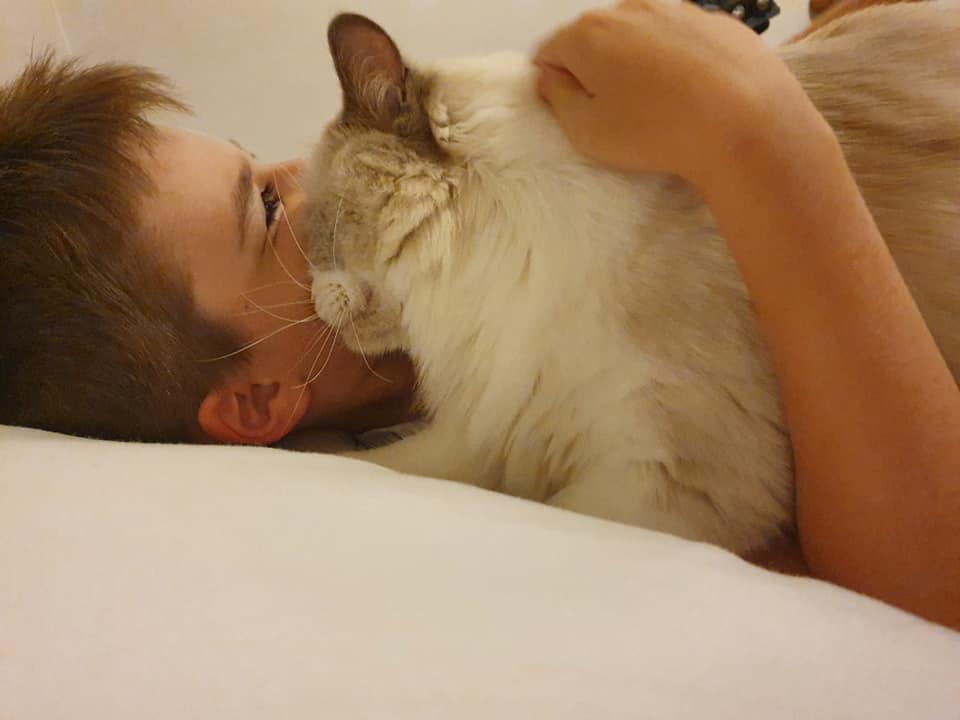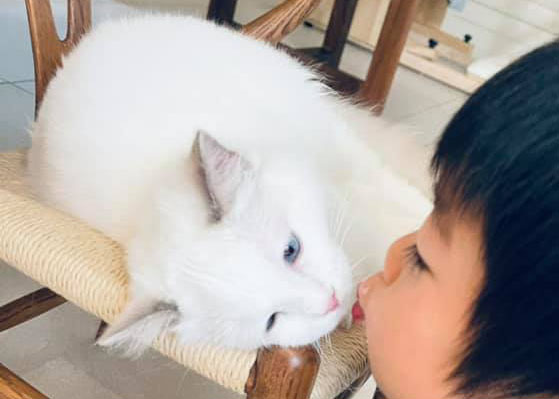Do Cats Feel Love When You Kiss Them?
Everyone who has and loves their cat gives them kisses regularly. You can’t help but wonder if a cat receiving kisses from you is feeling loved. Not all humans react the same way to being kissed, so why should we expect cats to feel the same way?
Every cat is different. While some cats enjoy being kissed, others will not. Some will feel love, while others will not see kissing as a sign of affection. There are better ways than kissing to show a cat affection that they will understand.
Cats are mysterious pets with distinct personalities. Almost every cat will show you how they are feeling without considering their human’s feelings. There are many other ways that cats will feel the love from their humans, besides kissing, and in return, cats have their own special ways of showing how much they love their humans.
Feelings That Cats Experience
Just like humans, cats experience an array of feelings. They certainly don’t show them the same way, but they can have similar triggers. Some things cats can feel that humans do are:
- Love
- Trust
- Fear
- Anger
- Stress
As further evidence that cats can feel love, it has been found that cats produce oxytocin just as humans do. Oxytocin is a hormone that is produced when we feel love and attachment. Cats are more likely to feel love when they can trust their owners and when their owners give them toys and treats.

How Cats Show Love
Since cats aren’t able to know and learn how to show love the same ways humans do, they have their ways of showing affection that has evolved through domestication. Almost all cats resort to body language and giving different tokens to show love and appreciation. Some cats are even vocal about how they feel.
John Bradshaw studied cat behavior in various settings, such as in catteries and on the streets. He analyzed how cats interact with each other and humans and has learned the different ways cats show their feelings.
When cats feel love and are relaxed, they will give their version of a “kiss”, which is slowly blinking their eyes. Cats will also perform other various behaviors to show their affection such as:
- Purring: cats will purr to show that they are relaxed and that they love you. Some cats will purr louder than others, but that doesn’t mean that they love you any less if they don’t purr loudly.
- Bunting: while your furry friend is laying on top of you, they may bunt their head at yours. This is another way they show you that they love you. They may also rub their cheek against you. These behaviors place their scent on you.
- Verbalizing: while cats don’t speak words, they can make various sounds that will tell you that they love you such as meows and chirps.
- Grooming is a common way for cats to show love and affection to other cats and humans. It can tickle a bit because a cat’s tongue is rough, but through these kisses, cats show affection and share their scent. Be careful though, some cats may give a little love bite!
- Belly plops will happen especially when a cat trusts you. They will plop onto their side and show you their belly. This almost always means that they want to be pet on one of their most vulnerable spots. Be careful though, sometimes it may be a trick for them to play with you!
- Gift-giving is a common and sometimes disturbing way a cat will show you love, trust, and that they consider you family. Don’t be alarmed if your cat brings in a dead bird and leaves it by your shoes. Indoor cats may do this with their toys.

How to Show a Cat That You Love Them
Cats speak and act in ways very different from humans. Many cats don’t appreciate most signs of affection that humans use, such as kissing and hugging. It is up to cat owners and cat carers to learn the language that cats use for the best communication possible.
Spending one-on-one time with your cat is a great way to show them that you love them. They will feel like the center of attention. You can do so many things with your cat, such as petting, massaging, and playing. You can also give your cat a “kiss” by slowly blinking your eyes at them, as they give us “kisses”.
While petting your cat, get to know the places they love to be pet and scratched and the places that they don’t like being touched. Be careful with massaging and petting your cat as well because some cats will eventually get overstimulated after being pet for too long. This can result in your cat becoming aggressive and attacking you.
Training your cat is an excellent way to show your cat you love them. This is an opportunity for constructive bonding time. It also creates a special “love” language that is unique to you and your cat. Use healthy treats, such as freeze-dried chicken or salmon to help assist in training your cat to come to you, to sit, and do different tricks like a high-five!
Giving your cat those healthy treats and some catnip or cat grass is a wonderful way to show your cat that you love and appreciate them. They will have endless entertainment and feel amazing while using the present you gave them.
While there are dozens of ways to show your cat that you love them, the best way to show them you care is to pay attention to their language and reactions. Know that if your cat is not in the mood for affection or play, just give them their space. If they don’t like being groomed, try not to do it as frequently. If your cat is not good with other animals, don’t bring others into your home.
If you are going to kiss your cat, be mindful of where you are kissing them. Avoid kissing their mouths because they harbor bacteria that can be harmful to humans. Outdoor cats may also eat some wild animals that can have diseases.
How to Know Your Cat is Angry With You
Cats can experience different feelings and can also get into different moods. Sometimes cats can get stressed and angry, just as humans do. There are some things that humans can do to make cats angry such as:
- Giving affection when your cat doesn’t want it
- Not keeping enough food or water out
- Having a dirty litter box
- Having a new pet in the house
- Boredom
- Going away on vacation
When cats are angry they will show aggressive behaviors, such as hissing, biting, and scratching. Some cats will also be stressed and shed, over-groom, and urinate outside of the litter box. The best thing you can do to make sure your cat is always happy is to avoid as many triggers for them, however, some triggers are unavoidable.
Going Away on Vacation
As humans, we need breaks from our lives and sometimes like to go away on vacation for a few days or a couple of weeks. Some cats may become angry and stressed while you are gone.
Cats are very independent and unless your cat has a medical issue, you can leave food and water out with a few clean litter boxes if you are going away for the weekend.
If you are going away longer than a weekend, it is a great idea to have a cat carer stay in your home or board your cat at a boarding cattery. At catteries, there is specially trained staff to care for and play with your cat. Most catteries require cats to be up to date with their vaccinations. Contact the cattery you choose for your cat to confirm the required vaccines.
Some great catteries in Gold Coast are:
- Catarama offers a spacious garden and playground and insulated cat boarding. There are different packages and fun boarding options for your cat. They supply your cat’s food, but if you choose to have your cat’s specific food, they won’t charge extra for feeding your cat.
Conclusion
Most cats don’t understand that kisses from humans are a sign of affection. A cat will surely let you know if they enjoy being kissed or not. The best ways to show your cat that you love them are to give them toys, treats, and plenty of one-on-one time. Cats will in return show love by grooming you, purring, and giving eye kisses.
If you are going on vacation and need to board your cat, don’t worry. Cats may feel a bit anxious, but once you are home, their love will return in time. Finding a great, reputable cattery or a cat carer will surely let your cat know that you love them, even if you are gone.
